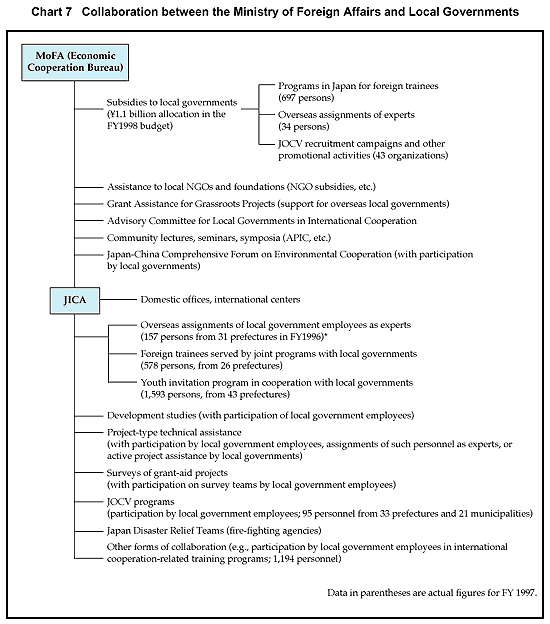Official Development Assistance (ODA)
14. Participatory Development: Assistance for NGO Activities
The aid activities of NGOs and local government organizations allow for a degree of fine-tuning that sets them apart from official aid at the government level. In addition, they have contributed to Japan's own internationalization. The Japanese government has decided to do what it can through its ODA frameworks to assist the activities of Japanese NGOs and municipalities.
1. Collaboration with NGOs
Japan has a subsidy framework through which it provides funding to subsidize the aid projects of Japanese NGOs. 30 Grant assistance for grassroots projects is another source of funding now utilized to assist NGO activities in the developing world. 31 Further, an international volunteer subsidy framework has been set up to pay the insurance premiums for volunteers who take part in disaster relief or rescue missions overseas.
In addition to the above forms of assistance, the government in 1996 inaugurated a regular NGO-MoFA meeting for closer dialogue and collaboration with NGOs on ODA policy- and project-related affairs. Japanese NGO professionals have participated in and provided valuable advice on the formulation of population- and AIDS-related projects as well as preparations for the overseas assignment of survey teams. Also, the government has collaborated with NGOs in evaluating ODA and NGO projects alike.
The March 1998 Japan-U.S. Common Agenda Open Forum had the participation of Japanese and U.S. NGO delegates as well as government officials from both countries and representatives from third countries and multilateral institutions. That forum devoted its attention to bilateral cooperation in such areas as population issues and AIDS, children's health, and environmental protection. NGO delegates took the opportunity to make recommendations to Japan and the U.S. on various issues discussed.
The council on ODA reforms has made several useful recommendations regarding strengthening support to and collaboration with NGOs. The Japanese government, for its part, is determined to pursue those recommendations.
2. Collaboration with Local Government Organizations
MoFA has a subsidy framework in place for the provision of financial assistance to local governments in Japan that run training programs for foreign engineers or participate in projects for the overseas assignment of specialists. Also, in connection with the Japan-China environmental cooperation model city plan, specialists from the Chinese model cities of Dalian and Chongging, as well as specialists in the environment field from the Japanese cities of Kita-kyushu and Hiroshima, now serve as members on an expert committee 32 that was set up to foster bilateral cooperation between Japan and China on environmental themes.
3. Recruitment of Volunteers and Experts
Run by JICA, the Japan Overseas Cooperation Volunteer program is an undertaking designed to assist in local economic and social development by assigning volunteers to projects in developing countries. Young Japanese nationwide are recruited for volunteer service within that framework. To date, the program has put a cumulative total of approximately 18,400 volunteers to work overseas. It has earned high acclaim in Japan as well as recipient countries. Efforts to recruit technical experts provide additional opportunities for participation in ODA programs by members of the Japanese public who are interested in international cooperation and who possess the skills and desire to aid economic progress in the developing world. In FY 1997, the Japanese government initiated an expert recruitment program on a trial basis, and was satisfied by the results. In FY 1998, 40 experts had been recruited as of this writing.

